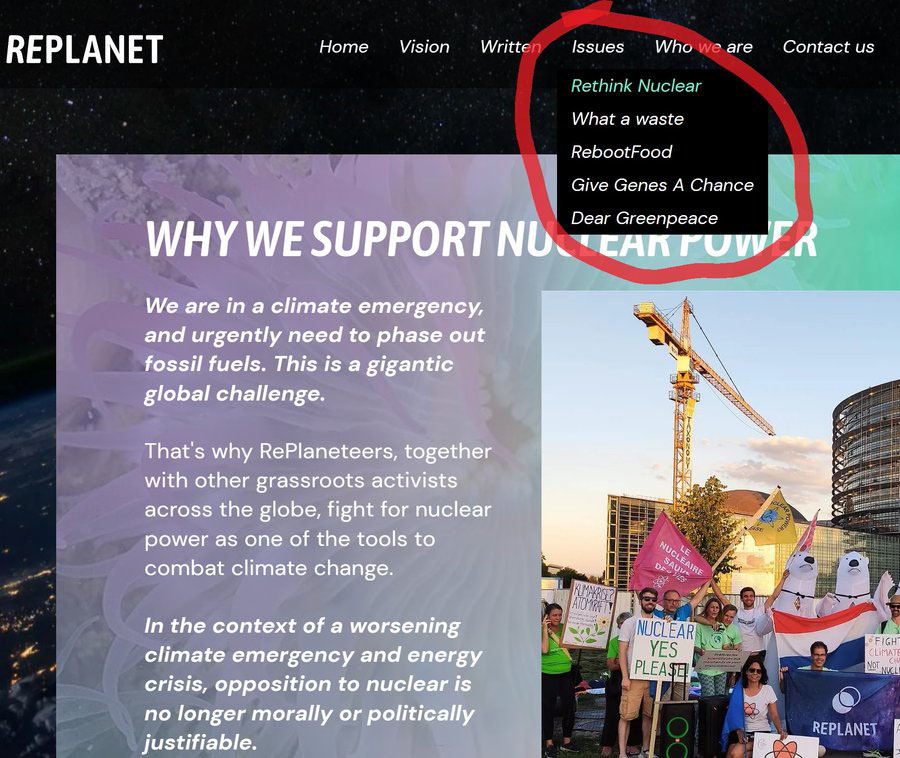Subscribe to Zero-Sum Pfear & Loathing



by Jonathan Matthews | Oct 4, 2023
George Monbiot has attacked The Land magazine for having succumbed to “the current wave of conspiracism” in its criticism of his involvement with Mark Lynas and the rebranded ecomodernist group RePlanet, who promote nuclear power, GMOs, and synthetic food.
Monbiot took exception to a lead editorial in The Land (issue no. 32) entitled Rebooting Reality: Ecomodernists want to ‘reboot food’: Mike Hannis smells astroturf. In the editorial, The Land’s co-editor, who is also a Senior Lecturer in Ethics, Politics and Environment at Bath Spa University, wrote about RePlanet and its Reboot Food campaign, as part of which, “RePlanet kindly funded a (Monbiot) speaking tour of Europe, and associated media blitz, promoting Monbiot’s controversial book Regenesis as a statement of their own position.” In Regenesis, it may be remembered, Monbiot promotes synthetic food as a silver bullet for eliminating livestock-related farming, thus enabling the rewilding of vast tracts of rural land.
In his editorial, Hannis pointed out how well RePlanet’s objectives serve the interests of industry. For instance, their Reboot Food campaign explicitly aims to secure state funding for the emerging synthetic food industry. He could equally have pointed to how perfectly RePlanet’s campaigning to suspend organic farming targets and deregulate GMOs synchs with key current campaign goals of the pesticides lobby in Brussels, where RePlanet has an office.
Hannis also noted that although RePlanet says it is “entirely charitably funded and strictly accepts no funding from industry”, it does accept funding from “charitable” foundations which, Hannis says, are “set up by companies and wealthy individuals to further projects they favour. The trail is not hard to follow.”
He went on to say, “As has been astutely noted by GMWatch, ‘Monbiot fits neatly into the ecomodernists’ rebranding exercise, [but] teaming up with Lynas is a seriously bad idea’. In short, Monbiot of all people is surely well equipped to see that RePlanet has all the hallmarks of a sophisticated astroturf organisation, whose real job is to advance industry interests, not least by weakening EU regulations around agrochemicals and ‘novel foods’.”
Monbiot’s angry response appears in the latest issue (no. 33) of The Land. He accuses the magazine of playing on “the ‘dark forces’ theme” beloved of conspiracists and writes, “Reboot Food is transparent about who funds it, what it is and what it wants. But, without advancing a shred of evidence, you accuse it of being ‘a sophisticated astroturf organisation, whose real job is to advance industry interests’. The only parts you missed are the Great Reset and the Illuminati.”
But Monbiot’s dismissive comments involve sleight-of-hand, because it is not just the Reboot Food campaign but also the organisation behind it that Mike Hannis accuses of being a vehicle for industry interests. And in the editorial Monbiot complains about, Hannis provided a very telling example of the gap between how RePlanet presents itself, as entirely independent of industry, and its actual campaigning.
Hannis noted how RePlanet had recruited Joel Scott-Halkes and another “repeatedly arrested Extinction Rebellion” activist “to join Lynas as the public faces of RePlanet UK”, and that their Extinction Rebellion (XR) “connection has been prominently flagged, no doubt to make RePlanet seem like a radical grassroots organisation”.
In his new role, Scott-Halkes can be found on social media lambasting “puritanical anti-science Greens” for supporting “outdated and restrictive regulations” on GMOs, which, when they hold back “precision fermentation” – the industry PR term for the synthetic biology process behind synthetic food, makes them guilty of “holding back actual planet saving”.
Scott-Halkes is equally passionate about nuclear power. In what Hannis calls “a bizarre article” written by Lynas, we are told how the “XR radical” fell “in love” with one of the casks of nuclear waste during a visit they made to the Sizewell nuclear power plant. “He was cuddling it, putting his face against it, showering it with affection. He was denied permission to kiss it, though only for hygiene reasons”. Lynas goes on, “I joined him and we hugged it together, thanking it for having generated so much zero-carbon energy and thereby helping tackle the climate emergency.”
That ardent promotional for nuclear power, Hannis says, needs to be seen in the light of RePlanet’s former “XR radical” having gone on to attend the COP27 climate conference as part of a delegation from the Canadian Nuclear Association – “the national voice of the Canadian nuclear industry”.
The current issue of The Land (no.33), as well as containing Monbiot’s attack, has responses from Hannis and his co-editor Simon Fairlie. It also has an article by Chris Smaje, author of the book Saying No to a Farm Free Future, which takes apart key arguments that Monbiot makes in Regenesis, not least his failure to take proper account of synthetic food’s massive additional requirement for electricity generation.
In Hannis’s response to Monbiot, he delves deeper into the question of RePlanet’s funding, which according to their website involves no industry monies because it comes “exclusively from charitable sources”, which they identify as the “Rodel Foundation, Quadrature Climate Foundation, The Dreamery Foundation and the Anthropocene Institute”.
Of these, their key funder is Quadrature Climate Foundation (QCF), which in 2022, according to accounts lodged with the Charity Commission, gave RePlanet over one and a half million pounds.
QCF, Hannis points out, is funded “from the very deep pockets of hedge fund Quadrature Capital Limited – an investment management company that made about £500 million in profits last year alone”. Most of that money went straight to the hedge fund managers but regarding the rest: “Their website explains that, like a medieval indulgence, transferring funds into QCF magically resolves any conflict between their purported values and the fact that they make their billions by investing in literally anything, including oil and arms companies.”
Indeed, in Quadrature Capital’s portfolio can be found not only significant financial holdings in the American oil and gas giant Chevron and the world’s biggest arms manufacturer Lockheed Martin, but also the world’s largest independent petroleum refiner Valero, the world’s biggest plastics polluter Coca-Cola, the multinational responsible for most of the world’s fracking Haliburton, not to mention ConocoPhillips – Alaska’s largest crude oil producer and the firm behind the hugely controversial Willow project to drill undisturbed public land in the Arctic.
So although Monbiot claims RePlanet is “transparent about who funds it”, money generated from financing some of the most damaging industries on the planet seems a world away from what most people would envisage when RePlanet tells them its funding comes “exclusively from charitable sources” and that it has “not received any funding from industry”.
RePlanet’s defenders will doubtless point out that Quadrature is just one of the sources of RePlanet’s funding and that RePlanet is far from the only “environmental” group to have been given monies by QCF. And indeed, QCF’s accounts show that in 2022, it gave money to WWF as well as to several less well known environmental groups. However, accepting grants from this “fossil fuel funder” has proved highly controversial and has led WWF to say it will investigate this funding source further.
There is also a big difference between the degree of financial dependence on Quadrature of RePlanet and that of WWF, for whom QCF funding constitutes a minute fraction of their overall 2022 income. RePlanet, on the other hand, has admitted that Quadrature money constitutes over 90% of its funding. And Dr Paul Dorfman of the Science Policy Research Unit at Sussex University puts the figure at close to 95%.
In other words, without Quadrature’s funding, RePlanet would barely exist, let alone be running campaigns in tune with industry lobbying: promoting nuclear power (Rethink Nuclear, What a waste), GMOs (Give Genes a Chance) and synthetic food (Reboot Food), while attacking Greenpeace (Dear Greenpeace) and, more generally, EU regulations.

This leads on to the question of why RePlanet, a newly established NGO with no track record of any kind, got more money from QCF in 2022 (£1,542,865) than WWF (£1,400,000) – the world’s largest conservation organisation with a track record stretching back seven decades.
That Quadrature’s willingness to fund this untried NGO so generously from the get-go might be for ideological reasons is suggested by the generous donation (£833,479) its foundation also gave to another organisation of a similar ideological bent: Dutch Ecomodernism.
QCF says it is “focused on unlocking the most urgent climate solutions”, which is exactly how ecomodernists pitch nuclear power, GMOs and synthetic food.
As Hannis sees it, “Such people will clearly never fund any version of environmentalism that involves challenging economic growth or capitalist ‘business as usual’. But their logic aligns perfectly with the ecomodernist project of ‘persuading’ governments to smooth the way for techno-fixes which promise to resolve inconvenient issues like climate change while opening vast new frontiers of profit for Big Tech and its investors. They therefore fund organisations like RePlanet, who promote such ‘solutions’.”
The irony is that George Monbiot has been among the most effective analysts of the appeal of ecomodernism to billionaires like Suneil Setiya, CEO of Quadrature Capital and trustee of QCF. In an interview with a Dutch publication, Monbiot talked about those who, like Bill Gates, were fixated on technological innovations as the solutions to the climate crisis because they enabled “the global pillars of market, growth and shareholder value” to “remain untouched and… humanity (to have) a delightfully neoliberal but sustainable future”. This, he said, “is the core of ecomodernist ideas”.
Among the “standard bearers” that Monbiot named in the interview for this market-friendly vision was the Dutch ecomodernist Hidde Boersma – a key player in RePlanet, and someone Monbiot now collaborates with.
As Mike Hannis says, if anyone were capable of joining the dots here, you’d think it would be George Monbiot.